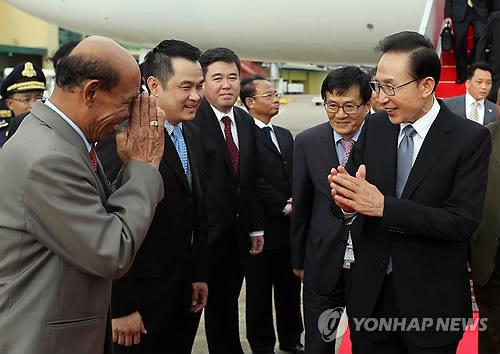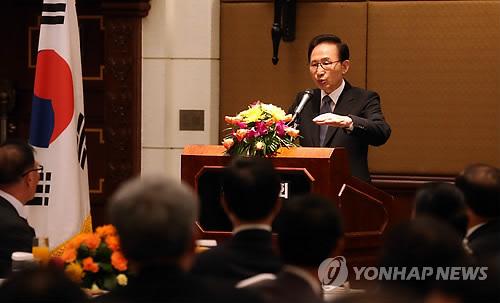South Korean President Lee Myung-bak arrived in Cambodia on Sunday for a series of international summits, including one involving the newly re-elected U.S. president, Barack Obama, about freer trade and other cooperation issues in the region.
The three-day visit to Phnom Penh is part of Lee's two-nation
trip that will also take him to the United Arab Emirates for talks expected to
focus on increasing atomic power and other energy and economic cooperation
between the two countries.
 |
On Monday and Tuesday, Lee will attend a trio of annual meetings: a summit with the 10 member nations of the Association of Southeast Asian Nations (ASEAN); a meeting between ASEAN and South Korea, China and Japan; and a meeting of the East Asia Summit (EAS) forum.
Both Lee and Obama are scheduled to attend the 18-nation
EAS forum. It will be their first meeting since the American president won
re-election, though it is unclear whether they will be able to find time for a
separate bilateral meeting because of tight schedules, officials said.
The most concrete outcome from the series of summits is expected to be a
declaration among 16 of the 18 EAS member countries to launch free trade
negotiations to forge what is dubbed the "Regional Comprehensive Economic
Partnership" or RCEP.
The EAS forum consists of the 10 ASEAN states,
South Korea, China, Japan, the United States, Russia, Australia, India, and New
Zealand. All but the U.S. and Russia are committed to attending the negotiations
aimed mainly at lowering barriers to trade and promoting freer flow of goods and
services.
The 16 countries have a combined gross domestic product
(GDP) of US$19.7 trillion won, and their trade volume reaches $10.1 trillion
with their combined population amounting to some 3.4 billion, according to the
Korea Institute for International Economic Policy (KIEP).
The regional
free trade pact would bring about up to $19.46 billion worth of economic
benefits to South Korea, and raise the country's economic growth by 1.76 percent
in 10 years after the deal takes effect. The projection is based on the
assumption that tariffs on all products, excluding rice, are removed.
Lee's summit with ASEAN is expected to center on reviewing recent progress in
relations between the two sides, such as the conclusion of a free trade deal and
the 2010 establishment of a strategic partnership, while discussing ways to
further deepen the ties, officials said.
ASEAN has emerged as an
increasingly important region to South Korea, with a combined population of 600
million and the GDP totaling $2.15 trillion, officials said. The 10-nation
region is South Korea's second-largest trade and investment partner, with
two-way trade volume amounting to $124.9 billion last year.
South
Korea also won construction orders worth $12.8 billion from ASEAN last year. The
number of visitors between the two sides has also been on the rise, with more
than 5 million people visiting the other side last year, officials
said.
"A lot of cooperation is under way between South Korea and
ASEAN. The 10 ASEAN nations represent the No. 2 export market for us after
China," Lee said during a meeting with South Korean residents in
Cambodia.
Despite global economic difficulties, ASEAN countries are
relatively faring well, compared with other nations, Lee said, adding that South
Korea's trade with ASEAN broke the US$100 billion mark last year and the region
is becoming increasingly important for Korea.
 |
The ASEAN plus three summit, involving ASEAN nations plus South Korea, China and Japan, is expected to discuss expanding the volume of a regional currency swap agreement, known as the Chiang Mai Initiative Multilateralization, to strengthen the regional financial safety net.
Other topics include adopting a new road map for the Asian Bond Markets Initiative and ensuring the implementation of the "ASEAN Plus Three Emergency Rice Reserve," a food stock formed with contributions from the members to be used when the supply becomes unstable.
While in Cambodia, Lee also plans to hold a bilateral meeting with Chinese Premier Wen Jiabao.
On Tuesday, Lee will head to Abu Dhabi of the United Arab Emirates for summit talks with President Sheikh Khalifa Bin Zayed Al Nahyan about increasing cooperation in various areas, especially atomic power plants, energy, trade and investment, and science and technology.
������������������������������������������������������������������������������������������������������������������������������������������������������������������










